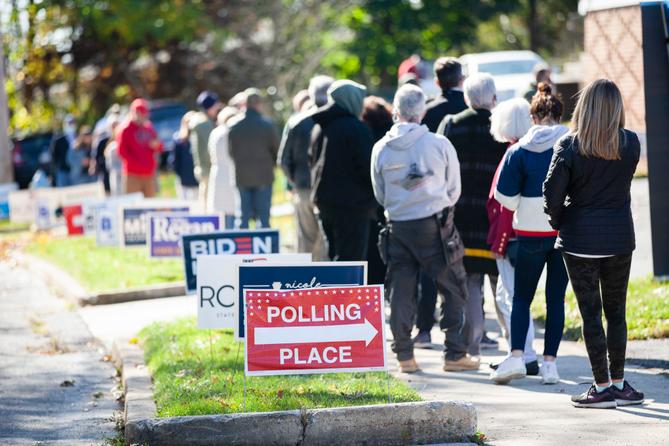This article is made possible through Spotlight PA’s collaboration with Votebeat, a nonpartisan news organization covering local election administration and voting. Sign up for Votebeat's free newsletters here.
UPDATE 12 P.M., Nov. 6: This article has been updated to include the number of provisional ballots received by the county.
An error that affected the ability of tens of thousands of Chester County voters to cast regular ballots on Election Day happened after county officials mistakenly failed to extract third party and unaffiliated voters from the state’s voter registration management database when creating a pollbook file for printing.
State officials say the county only extracted Republican and Democrat voters when the county prepared its pollbooks, leaving out the third party and unaffiliated voters. Pollbooks are lists of registered voters that workers use to check them in at voting locations.
“That is something that you sometimes see counties do, correctly, in a primary election,” Secretary of the Commonwealth Al Schmidt said, referring to the fact that third party and unaffiliated voters can’t participate in Pennsylvania primaries. “It appears that Chester did that pollbook extract and only included major party voters.”
On Thursday, Chester County confirmed voters submitted more than 12,100 provisional ballots, an amount far more than in other recent elections.
While many Pennsylvania counties have switched to electronic pollbooks in recent years, Chester County is still using physical paper pollbooks. This means if there is an issue with the printing of those books, additional pollbooks need to be printed and delivered to voting locations, as was the case Tuesday.
It’s unclear why no one caught the problem before Election Day.
“As far as how and why this happened, that is what we’ll be looking at once all votes have been counted, including the provisional,” county spokesperson Rebecca Brain said in response to questions Wednesday.
In Allegheny County, for instance, the process for approving paper pollbooks includes a “spot check” prior to printing, said David Voye, manager of Allegheny County’s division of elections. That involves checking some pollbooks to ensure they include both partisan and nonpartisan voters and that the list goes all the way from A to Z and hasn’t been cut off partway.
After Chester County learned of the error early Tuesday morning, it worked to print supplemental pollbooks that contained the names of the missing voters.
There are roughly 75,000 third party or unaffiliated voters in Chester County. The county delivered supplemental pollbooks to all precincts, but it took time. Until they arrived, voters who weren’t included in the originally printed pollbooks had to choose between voting using provisional ballots or coming back later.
County officials said all the supplemental pollbooks were delivered to all 230 precincts by 3:45 p.m. Because of the issue, a judge extended voting in Chester County until 10 p.m.
Brain said Tuesday that no precincts ran out of provisional ballots. Schmidt also said that Delaware and Philadelphia counties provided additional provisional ballot envelopes to the county, since those cannot be printed as quickly as additional ballots.
In the 2023 and 2021 municipal elections the county received 843 and 626 provisional ballots, respectively, according to state data.
In last year’s presidential election, the county received 3,454 provisional ballots.
Processing the ballots will begin Friday morning and continue for 12 hours each day until complete, according to a statement from the county Thursday.
Voting a provisional ballot comes with some additional risk of having the ballot rejected if every step is not properly followed. Voters must place their provisional ballot in a secrecy envelope, then place that envelope in an outer envelope. The outer envelope includes several fields that must be filled out by the voter and election official.
A Votebeat and Spotlight PA analysis found that ballot rejections for missing information in these fields, which do not relate to the voter’s eligibility, have been increasing in recent years.
Hoping to cut down on such rejections, the Department of State announced a redesign of the outer envelope earlier this year, starting with Tuesday’s election. Adoption of the new envelope by the counties was voluntary. Chester County said it was using the new version for Tuesday's election.
Electronic pollbooks can be updated automatically if they have internet access, although the Department of State currently does not allow them to be connected to the internet in Pennsylvania. In that case, they must be loaded with the lists ahead of time.
Asked if the state was considering allowing this connectivity to allow counties to quickly address pollbook problems, Schmidt said some counties have asked for it, and some have said they do not want it.
“So there isn’t complete unanimity,” he said, describing it as “something we have been constantly reassessing,” and said state officials are still working “to determine what steps would need to be taken prior to permitting counties with electronic pollbooks to establish that connectivity in real-time.”
Carter Walker is a reporter for Votebeat in partnership with Spotlight PA. Contact Carter at cwalker@votebeat.org.
